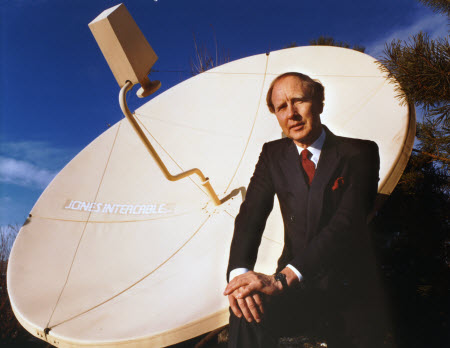Jones Was Cable’s Renaissance Man
The smarter way to stay on top of the multichannel video marketplace. Sign up below.
You are now subscribed
Your newsletter sign-up was successful

RELATED:Death of a Dragon Slayer
Poet, technologist, educator, businessman, entrepreneur — Glenn Jones was all of that and more to the people he encountered in the cable business over the past 50 years.
One of the true cable pioneers — he famously borrowed $400 against his Volkswagen to buy his first system in 1967 — Jones died at 85 years old on July 7. He leaves behind his companion of 34 years, Dianne Eddolls; daughters Christine Marocco and Suzanne Jones; son John Paul; grandsons Joseph and Daniel Marocco and David Jones; sister Ruth Terrian; brother Neil Jones; and numerous nieces and nephews.
In an industry full of outsized personalities, Jones stood out in his own way. Introspective and scholarly, he joined the U.S. Navy after graduating from Allegheny College with a degree in economics and served in its underwater bomb-disposal unit. He received a law degree in 1961 from the University of Colorado School of Law, and launched his cable career by representing MSOs in their acquisition efforts.
In 1964, Jones put his law career on hold to run for the U.S. Congress in Colorado’s First Congressional District (Denver). After an unsuccessful run, he decided to renew his focus on the cable television industry.
TOP-10 CABLE OPERATOR
But Jones made his mark in the cable industry, parlaying that $400 investment to help create what would at its peak become one of the 10 largest cable companies in the country with about 1.4 million subscribers. He sold Jones Intercable to Comcast in 1999.
The smarter way to stay on top of the multichannel video marketplace. Sign up below.
“I affectionately referred to Glenn Jones as the ‘cable poet’ because he was such a unique and multitalented individual,” Mediacom Communications founder, chairman and CEO Rocco Commisso said in a statement. “After 32 incredibly successful years at Jones Intercable, Glenn followed his entrepreneurial instincts and poured his creative talents into a number of other highly successful ventures.”
Jones wrote a lot of poetry — he published several volumes of Briefcase Poetry of Yankee Jones — but that wasn’t his only passion. Over his nearly 50 years in the business, he pioneered forming public limited partnerships as a way to finance cable acquisitions, laid the groundwork for what would become the industry’s most profitable business line — high-speed Internet service — and created the first accredited online university in Jones International University.
“Glenn was truly a Renaissance man,” said friend Decker Anstrom, the former National Cable Television Association president and former president of Landmark Communications. “He had such varied interests. You could sit down with him and one moment he’d be talking about finance, then about poetry or politics. And of course his true passion was education.”
And he wasn’t afraid to take on a fight.
Anstrom cited the significance of Jones’s Alexandria, Va., system, which first showed the power of two-way cable by demonstrating an Internet connection in 1993. At that time, there was a lot of turmoil in the industry as telcos were putting heavy pressure on Congress to allow them into the cable business.
“Glenn’s basic view was, ‘Why should we be afraid of that?’ ”Anstrom said. “We’re more nimble, we will have a better plant and we’ll be able to do things they can’t do, and we have this relationship with customers through our video service.”
It helped that at the time, as Congress was pushing for more competition in the video industry, it also was looking for new phone-industry entrants to balance out the telcos’ dominance of that business.
VITAL DEMONSTRATION
“I think Glenn’s ability to demonstrate hands-on what could happen was very pivotal in changing a lot of people’s minds that cable could be the competitor to wireline telephony,” Anstrom said. In order to do that, Jones and the cable industry convinced regulators that MSOs needed access to investment capital to rapidly upgrade their plant, which led to the reversal of the 1992 Cable Act and to the 1996 Telecom Act.
Jones also recognized early that original content would drive pay TV subscriptions. He had a hand in creating several networks through his Jones Media Networks, including Great American Country, which was sold to Scripps Networks in 2004, and Knowledge TV. His Jones Entertainment Group produced award-winning documentaries and movies such as The Mystery of Genius, The Secret of Roan Inish, The Story Lady, The Whipping Boy and The Little Kidnappers.
“Glenn was a man before his time,” Jones/NCTI CEO Stacey Slaughter said in a statement. “He leaves a tremendous legacy for our Jones companies and for the industries he served.”
A memorial service for Jones is scheduled for July 29 11 a.m. (MT) at the Ellie Caulkins Opera House in the Denver Center for the Performing Arts (1101 13th St.) in Denver. A reception will follow in the Seawell Ballroom.
In lieu of flowers, donations may be sent to: Denver Area Council, Boy Scouts of America, 10455 W. 6th Ave. No. 100, Denver, CO, 80215; or Volunteers of America, Colorado Branch, 2660 Larimer St., Denver, CO, 80205.
